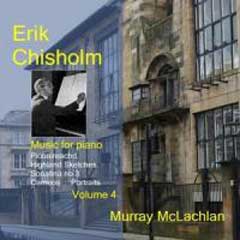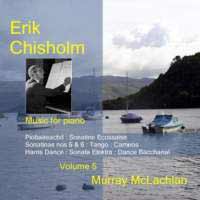|
 ERIK CHISHOLM Music for piano Volume 4 & 5 ERIK CHISHOLM Music for piano Volume 4 & 5
Piobaireachd for solo piano nos. 5-8,10-13
Sonatina no. 3
Eight Cameos
Six Highland Sketches
Six Portraits
Murray McLachlan (piano)
Divine Diversions: DDV24134 [76 mins - released November 2008]
This has been received for review alongside re-issues of the earlier volumes, now all coming out on Divine Art (Dunelm Series). My regard for Chisholm grows with each new recording of his music. Every piece is strongly characterised and his musical language(s) are widely derived and have a feeling of original thinking.
The project is clearly a labour of love and the detailed notes by John Purser lift it; there are many evocative descriptions, e.g. The Mirror (Cameo No 4) is "more a mirror of water than of glass" and there are numerous like felicities. This newest attempt to bring Chisholm out of the shadows ought to succeed; a composer well worth exploring for piano students of all levels. felicities. This newest attempt to bring Chisholm out of the shadows ought to succeed; a composer well worth exploring for piano students of all levels.
Vol 5 Divine Diversions: DDV24140 [75 mins - released May 2009]
This album maintains the standard of this series, one of the most worth-while integrales in recorded history of pianist/composers.
The notes go into detail of the close relationship between Chisholm and Bartok in 1932-33 and the music ranges widely, making a fine recital programme. Some of the music is readily accessible; others require and receive the virtuosity of Chisholm's dedicated champion, Murray McLachlan.
Peter Grahame Woolf
ERIK CHISHOLM Music for piano Volume 2
Eight preludes from "Twenty-Four Preludes from the True Edge of the Great World"
Airs from the Patrick MacDonald Collection (revised 1951)
Murray McLachlan (piano)
Dunelm CD DRD0223: [TT 77 mins]
This new release has given me particular pleasure, and the music is accessible for (fairly advanced) non-professional pianists. The Preludes are 'meditations or improvisations on some aspect of a melody which may only appear in full once in the whole piece' (John Purser). I have received from the Scottish Music Centre a manuscript copy (in the composer's own hand?) of some of them and have verified my impression that they are very pianistic, the figurations lie comfortably under the hands, and they are rewarding to study and play. Likewise the attractive 31 short Airs, which should not be played straight through.
Documentation and commentary by John Purser is impressive, and this series deserves wide dissemination.
|

